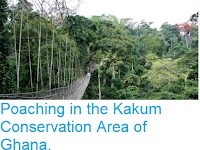One person has died and several more have been injured in a clash between park wardens and villagers belonging to the Miti ('Pygmy') group near the Kahuzi Biega National Park, an important Gorilla Sanctuary in South Kivu Province, Democratic Republic of Congo, on Wednesday 17 July 2019. The park wardens were reportedly following a group of suspected poachers leaving the park, when they were ambushed by villagers armed with bows and machetes. Several people were injured on both sides, with one warden loosing several fingers to a machete blow and a villager called lwaboshi Simba being shot dead.
An anti-poaching patrol in the Kahuzi Biega National Park. Shreya Dasgupta/Mongabay.
This is the latest in a series of clashes between the Miti people and the authorities over access to the park, which forms part of their traditional land but to which they now claim they are denied access, a dispute which led to the death of a park warden in April this year. Park authorities accuse the Miti and other forest dwelling communities of damaging the park by deforestation, principally the cutting down of trees for charcoal production, while local communities claim the park authorities have reneged on commitments to involve them in the management of the park.
Miti villagers at Buyungule village, just outside the Kahuzi Biega National Park. Primate Expertise.
The Kahuzi Biega Nationl Park is home to a population of about 125 Eastern Lowland Gorillas, Gorilla beringei graueri, and is one of the few places where tourists can visit Gorillas in the wild. At 6000 square kilometres the park is also one of the largest in the Democratic Republic of Congo, roughly the same size as Delaware or The Gambia. This makes the park a significant source of income for the Democratic Republic of Congo, but a significant loss of available land to local populations, who have been intermittently excluded from the park since its creation in 1970 by the Belgian photographer and conservationist Adrien Deschryver. The park authorities claim that local populations are major beneficiaries of the park, citing 350 children currently receiving schooling in the area, as well as two people from local communities attending universities, as well as jobs created in the tourism industry, and projects promoting Bee Keeping and Goat Breeding, though many people in the area complain this does not equate to the loss of access to traditional resources represented by the park.
Aerial view of the Kahuzi Biega National Park. Forest Service/US Department of Agriculture/Wikimedia Commons.
See also...
Follow Sciency Thoughts on
Facebook.









